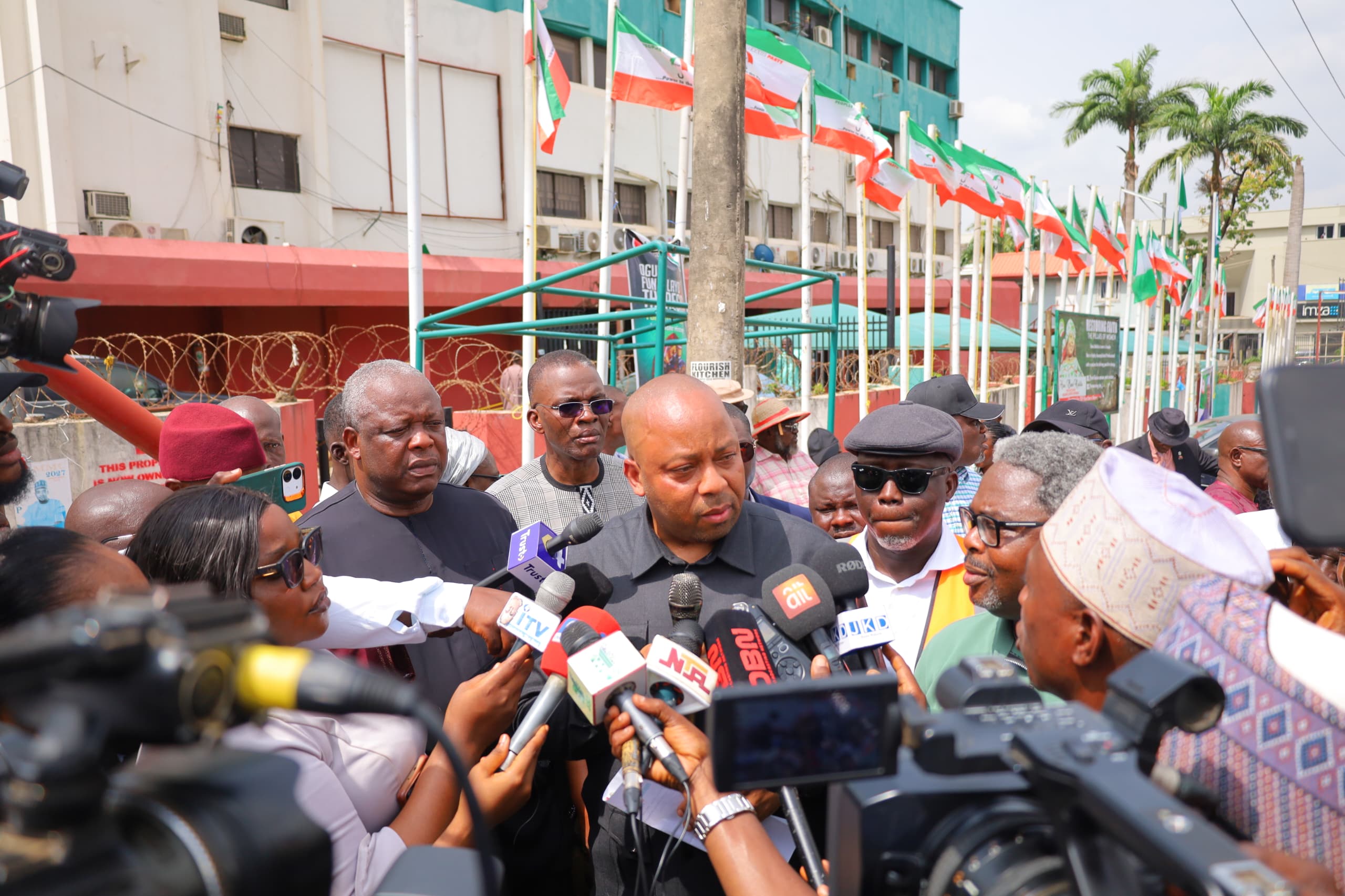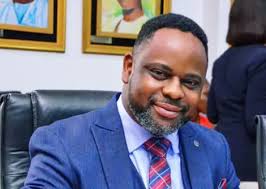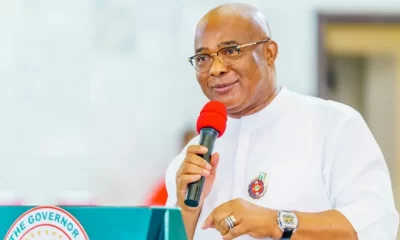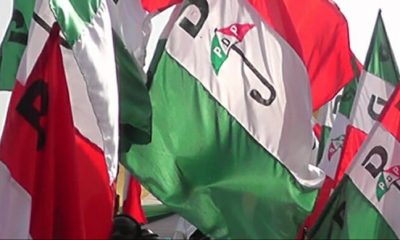COVER
FG May Engage Private Sector to Close $10bn Power Supply Gap

By Tony Obiechina, Abuja
The Federal Government of Nigeria has disclosed plans to source from the private sector, part of the $10 billion required to provide regular electricity across Nigeria within the next five to 10 years.
This formed the crux of the deliberation when the Director General of the Infrastructure Concession Regulatory Commission (ICRC), Dr Jobson Oseodion Ewalefoh paid a courtesy visit to the Minister of Power Chief Adebayo A.
Adelabu yesterday in Abuja.The duo agreed that in view of the funding and technical requirement needed to advance the power sector in Nigeria, it had become imperative to seek private sector input through Public Private Partnership (PPP) in co-financing and providing expertise that will ensure optimal performance of power infrastructure.
The Director General of the PPP regulatory body said that in view of the importance of power to the economic development of Nigeria, optimizing performance of existing infrastructure as well as funding new ones was imperative.
He acknowledged the challenges in the sector was hydra-headed and went beyond funding alone, adding that with such inter-agency collaboration and partnership with the private sector, the limitations can be addressed.
Reacting to a comment by the Minister, the DG said that through its regulatory processes, the ICRC can midwife private sector investment of part of the $10bn in the power sector to provide regular electricity, attract more foreign direct investment to other sectors and ultimately grow the economy.
“Revamping the power sector requires planning, it involves investments and it takes time. So, we need to collaborate to solve the issues in this sector.
“The investment required in power is very huge and government cannot fund it alone, so we have to leverage on the financing capacity of the private sector. That is why the ICRC was set up to regulate this leverage.
“The Commission is poised to regulating the processes of attracting investment to the power sector”.
He commended the Minister for his vast knowledge of the sector, pointing out that Mr. President’s choice of him was commendable.
Dr Ewalefoh said that in a bid to accelerate PPP investment as directed by President Bola Ahmed Tinubu, the Commission had issued a 6-point policy direction which has ultimately streamlined the process of PPP service delivery.
The DG stressed that whereas the processes have been streamlined to accelerate project delivery and encourage investors to adopt PPP, the Commission was not relenting or compromising on its stringent regulatory function so as to forestall contingent liabilities or unnecessary delays by companies that lack the requisite capacity.
In view of the above the ICRC’s helmsman added that the Commission was now insisting on inserting conditions precedent to all PPP agreements such that any preferred bidder that defaults will have their agreement automatically nullified by reason of their default.
In his response the minister commended the DG for the initiative to visit the ministry with the proposal of advancing investment in power sector through PPPs.
He said, “For us to achieve 24 hours power supply across Nigeria in the next 5 to 10 years, there is a minimum funding requirement of about N10 billion in the next 10 years.
“The government cannot afford that, when there are other critical sectors in need of funding.
“Can government do it alone? No! which is why we have to look for or marshal private sector fund while still retaining government interest and ownership. That is where ICRC comes in.“We need to do this in collaboration with the private sector and the best way is through concession.”
COVER
Dangote Beats MTN, DSTV, AZAM to Emerge as Most Admired African Brand

By David Torough, Abuja
It was another historic milestone for pan-African investor Aliko Dangote and the Dangote Industries Limited over the weekend, as they garnered three prestigious accolades at the 15th annual Brand Africa 100 awards, held at the iconic Africa Hall in Addis Ababa, Ethiopia—the birthplace of the Organisation of African Unity (OAU), now the African Union (AU).
Dangote Industries Limited was named Most Admired African Brand, following an independent, consumer-led survey conducted across more than 30 African countries. The company was also inducted into the Brand Africa Hall of Fame, becoming the first African firm to receive this distinction. The induction recognises Dangote’s transformative impact on African consumers and its influential role in shaping a positive narrative for the continent.President/Chief Executive, Dangote Industries Limited, Aliko Dangote was honoured with a Lifetime Achievement Award in recognition of his leadership in driving impactful industrialisation, establishing a world-class African brand and reshaping the continent’s economic future through a benchmark, homegrown enterprise.Joining Dangote Industries in the inaugural Hall of Fame were MTN, M-Pesa, Ethiopian Airlines, and South Africa, for consistently ranking among Africa’s most admired brands over the past 5 to 15 years and for building sustainable, globally respected brands.Reacting to the awards, Group Chief Branding & Communications Officer, Dangote Industries Limited, Anthony Chiejina, said the honours reflect the unwavering commitment, excellence, and innovation that define the group’s journey. He added that they are a testament to the dedication of the company’s outstanding team, partners, and stakeholders, who continue to believe in the mission to drive sustainable development and economic growth across the continent.”We also extend our heartfelt appreciation for the Lifetime Achievement Award presented to our Founder and President, Aliko Dangote for building a purposeful world-class industrial brand that has exceptionally transformed African lives and the African narrative. This accolade celebrates not only his visionary leadership but also his tireless efforts in transforming industries, creating opportunities, and championing African enterprise on the global stage. His legacy is an inspiration to generations of entrepreneurs and leaders across Africa,” he said.Noting that the recognition would further inspire the company to push boundaries, empower communities, and deliver meaningful value across Africa and beyond, Chiejina reaffirmed Dangote Industries’ commitment to excellence, integrity, and transformative growth.In his keynote address, United Nations Under-Secretary-General and Executive Secretary of the Economic Commission for Africa, Mr Claver Gatete, praised Aliko Dangote, the Hall of Fame inductees, and the Brand Africa laureates for advancing the African agenda.He highlighted the alignment between Brand Africa and the ECA’s mission to promote inclusive industrialisation, regional integration, and private sector-led growth. He also called for increased investment in youth-led innovation, regional value chains and the establishment of a Pan-African Creative Innovation Fund to identify, finance and globalise Africa’s most promising brands.”I wish to particularly acknowledge MTN, Dangote Group, mPesa and Ethiopian Airlines for consistently maintaining their distinguished positions among the “Most Admired African Brands” category and continuing to set benchmarks in brand leadership, innovation and continental impact,” he said.COVER
Land Revocation: FCTA Seals PDP Secretariat, FIRS, Access Bank, Others

By Johnson Eyiangho and Laide Akinboade Anima, Abuja
A team from the Federal Capital Territory Administration (FCTA) on Monday sealed the Peoples Democratic Party (PDP) national secretariat, Wuse Zone 5, Abuja.The sealing of the PDP secretariat came barely 24 hours to the much anticipated meeting of the party’s National Executive Committee (NEC) scheduled for Tuesday.
The national secretariat also serves as the venue to the PDP NEC meeting. A joint taskforce comprising officials from the FCTA, Police, DSS, Army, NDLEA and NSCDC stormed the Secretariat at about 2.04pm and sealed the office shortly after a crucial meeting of the PDP National Working Committee (NWC).However, after a briefing meeting between the FCTA and PDP officials, all cars parked in the premises of the Secretariat were allowed to move out, while the PDP’s officials rushed to Bauchi State Governor’s Lodge for the Caucus meeting of the party.The sealing of the Secretariat is widely perceived as a strategic escalation in Wike’s ongoing feud with leadership of the party, particularly those pushing for the removal of his lackey, Senator Samuel Nnaemeka Anyanwu, as National Secretary of the party.Meanwhile, the National Working Committee (NWC) of the PDP has vowed that the National Executive Committee (NEC) meeting slated for Tuesday May 27, 2025 will be held as scheduled.A party official who did not want to be named described the sealing of the Secretariat as a temporary setback, vowing that all party activities leading to NEC and beyond will continue.The National Caucus Meeting, Board of Trustees and Governors meetings are part of activities ahead of the NEC meeting.The FCT Minister had revoked over 4,700 properties due to long-standing non-payment of ground rent to the Federal Capital Territory Administration (FCTA).Also affected by the Monday exercise are Access Bank, the Federal Inland Revenue Service (FIRS), Ibro Hotel and Total Energy in Abuja.The enforcement, which began in the Wuse District, was led by FCT Minister’s Senior Special Assistant on Public Communications and Social Media, Lere Olayinka, Director of Land Administration, Chijioke Nwankwoeze and Director Department of Development Control, Mukhtar Galadima.Speaking during the sealing of Plot 534, Cadastral Zone A02, Wuse Zone 1, belonging to Total PLC, Galadima said, “Today is about walking the talk. We announced this earlier, and we are here to implement what we said to take possession of all revoked properties, starting with this plot.”He noted that the Total PLC property had accumulated over 10 years of unpaid ground rent, leading to its revocation in March 2025.Also sealed was the Access Bank branch located on Plot 2456, Wuse 1, Cadastral Zone A02. The property, however, belongs to Rana Taher Furniture Nigeria Limited and was revoked due to 34 years of unpaid ground rent.Galadima said the enforcement would proceed to other parts of the city, including the Central Area, after the Wuse district.Tinubu Intervenes, Gives 14-days GracePresident Bola Tinubu has intervened on the ongoing enforcement of possession of 4,794 properties revoked for non-payment of ground rent from 10 to 43 years and has given them 14 days ultimatum to pay up.This was revealed at a briefing by the Director of Land Administration, Chijioke Nwankwoeze, in Abuja.He said the defaulters have been given 14 days to pay up all outstanding and the penalty fees.The Director of Land noted that even though properties owned by government institutions, corporate organisations and individuals were affected, the Administration is committed to carrying out its functions without fear or favour.He said, “However, the President, His Excellency Bola Ahmed Tinubu, GCFR, has intervened. Therefore, by Mr. President’s intervention, holders of the affected properties now have 14 days (TWO WEEKS) to settle the outstanding Ground Rents, with associated penalties.”For properties in the Central Area, the sum of N5 million will be paid by the defaulters as penalty, in addition to the Ground Rent owed.”Those in Maitama, Asokoro, Wuse II, and Guzape Districts will pay the sum of N3 million as penalty, in addition to the Ground Rent owed.”Defaulters in Wuse I, Garki I and Garki II will pay N2 million as penalty in addition to the Ground Rent owed”.He added, “Also, all those who purchased properties from other people, but are yet to register their interests by obtaining the mandatory Minister’s Consent and registering their Deeds of Assignment now have 14 days (TWO WEEKS) to do so at the FCT Department of Land Administration.”Furthermore, the Minister of the Federal Capital Territory (FCT), Barrister Nyesom Ezenwo Wike, CON, has granted a 14 days (TWO WEEKS) grace period to all property holders in the FCT to pay up their Right of Occupancy (R-of-O)/Certificate of Occupancy (C-of-O) bills, or risk revocation of those titles”.The FCT Minister therefore urged property owners in the FCT to ensure that they pay all necessary bills and charges on their properties as at and when due, so as to enable the government to continue to carry out necessary developmental projects for the benefit of the people.COVER
Herdsmen Attack again, Kill 42, Sack Benue Four Communities

From Attah Ede, Makurdi, Joseph Amedu, Lokoja
Over 42 persons have been reportedly killed, with seven others badly injured and two persons kidnapped in the latest attacks on four communities in Gwer west Local Government Area (LGA) of Benue State.It was gathered that most residents have fled their communities as the attacks have become a daily occurrence.
According to a local source, while over 20 persons were killed in Aondona community, seven others were killed in Ahume, five in Tyolaha along with six persons killed in Orbiam community and two others kidnapped near a military base in the local government area respectively. The source further said that the armed Fulani herders first attacked Aondona town on Sunday at about 4pm and continued yesterday at Ahume and a Military Base at Orbiam and Tyolaha.”I can categorically confirm to you that 20 persons were killed in Aondona, five in Tyolaha, seven killed in Ahume and 6 others were killed in Orbiam at the Military Base which is just three Kilometers away from Naka town, while seven people were injured with two others kidnapped.”The local government council in collaboration with stakeholders in Nagi set up a search and rescue operation team. So far, the search and rescue team has recovered six corpses this morning (Monday), while the injured ones have been evacuated to general hospital Naka for medical attention.”As I speak with you, our people have fled all the communities in the affected areas. The whole communities have been deserted and taken over by herders. We can no longer go to farms, children have stopped going to school, while markets and churches have been shutdown due to the activities of these Fulani terrorists occupying communities. Government must do something, they must act fast to stop these incessant killings in Benue State particularly in Gwer-West”, the source said.The Chairman of Gwer-West Local Government Council, Victor Ormin confirmed the incident, saying that the killing was still on as over 42 people have been killed so far.He described it as a “Pathetic situation”, revealing that recovery of corpses is still ongoing and over 30 dead bodies have been recovered so far between Sunday and Monday(yesterday).According to him, when he confronted the military on why they are adamant to engage the armed herders, the military personnel told him they were yet to receive a directive from higher authorities to engage them.”Only yesterday, I buried five people, fathers of children and when I confronted the military to engage the killers of my people, they told me that they are waiting for a directive from higher authorities.”So, until my people are all killed before the federal government would give directives to military personnel before engaging these people.”They are claiming that they don’t have the mandate to engage these people, that it is only the federal government that can give them the mandate to engage these people. So, my people should be killed, dead all before the federal government would talk about it; what is the meaning of this?”Yesterday I buried a father and two of his children over 40 to 50 years of age in Tse- Orbiam, very close to a military base. What is the meaning of this? Now we are talking about 40 or more people. This is genocide.”If they cannot help me, maybe I will leave this chairman seat and let it continue the way it is. I don’t care about being a chairman of a people that are all killed. Look at a child of two years old butch with cutlasses.”More than 20 people were killed in Aondona village. This is a village of the former first lady of this state, Eunice Ortom. This is the village of Tor Gwer, this is the village of Bishop of Makurdi catholic diocese Bishop Anagbe. This is talking too much to condole and I can tell you, whatever will happen, will happen. Thank you”.”We are not saying that the military is incompetent, the soldiers are waiting for the orders and the mandate to do what they have to do which have not been given.A Mobile police man, identified as Magaji, was killed yesterday. He has dedicated his whole life to service, he is always at that junction along Naka road whether he has bullets or not. Yesterday when they came, they said he finished his ammunition and was scouting for people to leave and Magaji was killed yesterday. This is genocide.As of press time, the Benue State Police Command was yet to confirm the ugly development in Gwer-West Local Government Area. All efforts to get confirmation from the command’s police public relations officer, Catherine Anene was unsuccessful as she could not respond to text or calls.Kogi Auto-Crash Claims 19, Injures EightThe Federal Road Safety Corps (FRSC) on Monday confirmed that no fewer than 19 persons died and eight others injured in an auto crash which occurred on Sunday along Lokoja-Obajana road.State Sector Commander of the corps, Kumar Tsukwam confirmed this to DAILY ASSET in Lokoja on Monday.Tsukwam said that some of the survivors sustained bruises, cuts, dislocations, fractures, and fire burns.He said that the fatal accident occurred at Gadabiu community along the Lokoja-Obajana road in Lokoja Local Government Area of the state around 4pm on Sunday.He revealed that among the 19 burnt to death, were five children.According to him, the fatal and very sad accident involved an articulated vehicle (Truck) and a Toyota Hummer Bus heading to Abuja from the South.He said that it was a head-on collision when the bus on high speed tried to overtake an articulated vehicle only to face an incoming articulated vehicle with no option.“It was very unfortunate, because it was caused by speeding and wrongful overtaking and involved 27 persons with only eight survivors.“Our rescue operation team and the police were able to rescue the eight survivors and rushed them to Fisayo Hospital, Obajana for immediate medical attention.The commander said that the highways were not race roads and appealed to motorists to avoid speed and wrongful overtaking.He also tasked motorists to always keep to traffic rules and regulations to help the corps and the federal government in reducing road traffic crashes and carnage on roads across the country.




















